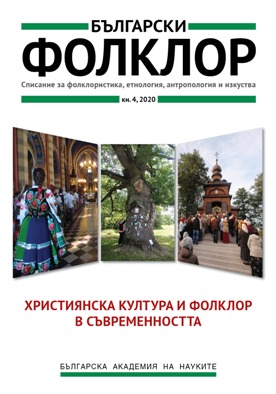Католическият празник Тяло и Кръв Христови в българско и полско село (Съпоставително изследване)
The Catholic Feast of the Solemnity of the Most Holy Body and Blood of Christ in a Bulgarian and a Polish Village (A Comparative Study)
Author(s): Natalia RashkovaSubject(s): Politics / Political Sciences, Christian Theology and Religion, Politics, History, Anthropology, Social Sciences, Fine Arts / Performing Arts, Cultural history, Customs / Folklore, Music, History of Church(es), Visual Arts, Local History / Microhistory, Oral history, Social history, Theology and Religion, Comparative Studies of Religion, Cultural Anthropology / Ethnology, Culture and social structure , Social development, Sociology of Culture, Other Christian Denominations, Film / Cinema / Cinematography, Sociology of Religion, History of Religion, Politics of History/Memory, Politics and Identity, Identity of Collectives
Published by: Институт за етнология и фолклористика с Етнографски музей при БАН
Keywords: Catholic feast of the Solemnity of the Most Holy Body and Blood of Christ; procession; religious identity; local culture
Summary/Abstract: In the thirteenth century, in the calendar of the Catholic Church, a special day is established to honour the Holy Communion – the bread and the wine, turned into the Most Holy Body and Blood of Christ. The feast is celebrated everywhere in the Catholic world with a solemn liturgy and a procession. The article presents in a comparative perspective fieldwork observations and documentation of this Catholic feast in two villages in Bulgaria and in Poland: the village of Oresh, Svishtov region (in 1995 and 2015) and the village of Złaków Kościelny, Łowicz district, Łódź voivodeship (in 2016). The author outlines the specific characteristics in performing of the feast in the two communities (Corpus Christi in Oresh; Boże Ciało in Złaków Kościelny), conditioned by differences in the confessional and cultural history as well as by different conditions of practicing the religious traditions.The comparative study shows the significance of local identity, expressed through elements of inherited traditional culture. For the Bulgarian Catholics, cultural identity is affirmed mainly through their religious affiliation, which is different from the official Orthodox religion, predominant in the country. The revival of the festive Catholic processions in modern times is an expression of the desire for a sustainable connection with the restored family and community confessional tradition. An essential expression of the local specificity in the religious festivity of the inhabitants of the Polish village is the adherence to traditional elements of the folklore culture, which have cultivated the local religious tradition.
Journal: Български фолклор
- Issue Year: XLVI/2020
- Issue No: 4
- Page Range: 411-430
- Page Count: 20
- Language: Bulgarian
- Content File-PDF

